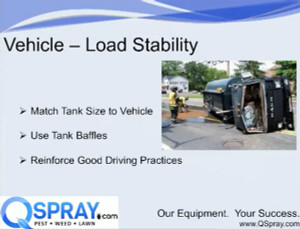Importance of Proper Vehicle Load Stability
Posted by Andrew Greess on May 7, 2018
Why is your vehicle's load stability is important: because overloading it can cause avoidable accidents. We all know that the roads are full of distracted drivers these days – texting when they shouldn't be, eating while driving, talking on the phone or just to other passengers. Having an overloaded truck in which the load may fall onto the busy roads or having a water tank that is too full, will add a different factor in an accident.
The water tanks on our trucks are probably the biggest culprit in accidents. A tank of water will slosh and depending on the amount can affect the way vehicle will respond in an accident. A partially full tank will slosh around more than a full tank and in an emergency braking situation can prevent braking in time or cause the truck to roll over. Be sure that your tank isn't too large for your vehicle to help prevent accidents like this. Many companies sell baffling to add to their tanks to prevent water surges.
And what's in your tank? It's also good for your tech's to have the knowledge the type of chemicals they are transporting. Should they be involved in an accident you don't want the Sheriff on the evening news going on and on about a hazardous chemical spill with the HAZMAT team in the background proudly showing off your company truck overturned spilling out something.
Especially when tossing down some kitty litter and sweeping it up will take care of the situation without any further damage because it was just a chemical compound extracted from a flower. Teach your tech's about the chemicals they are laying down and transporting so they can be a credible witness should they be involved in an accident.
Stay tuned for the next part of the video series on avoiding acute injuries.
Andrew Greess: Load stability, this is a little bit of a different issue. This is making sure that your load is stable, and for most of us, the stability, the main issue is the water in the tank. The key point here is, don't overload your vehicle.
Don't put too big a tank in your vehicle because it will affect your maneuvering, your control and stopping. Anyone who's driven a truck with a half full tank knows when you hit the brakes, you really feel that water.
Here's an example I found on the Internet of a guy who started off thinking his load was secure, and wow, it's not. Shocker, but there are some really good examples. I mentioned the tank.
A full tank is easier to control than a half full tank because in a half full tank, that water sloshing around and you can really feel it when you're stopping in a light, but customers are going to smaller trucks to save on gas. We have more distracted drivers, both the technician driving and the person in front of you who's texting his or her girlfriend or boyfriend.
That's what scares me, and here's a picture of it. This is a water tank on a residential street, so this truck could not have been going that fast, I mean 30 or 40 miles an hour at the top, and it rolled. You clearly want to match your vehicle to your tank size, or your tank size to your vehicle.
You can put tank baffles in your tank to reduce that water surge. You want to reinforce good driving practices if you're the company owner. Have your insurance agent come and do a class on driving safety, but I've got a perfect example of this.
About probably 13 or 14 years ago, a friend of mine was a salesman for a large chemical distributor in this town, who you would know. He is driving though Phoenix one afternoon, and he sees one of his customers' pest control trucks on its side, and there's water everywhere, so the tank had spilled.
There's hazard tape everywhere, there's fire engines, there's HAZMAT, there's sirens, there's all kinds of craziness going on. My friend mike goes up to the guy with the biggest hat and says, "Hey, chief, that's extract of chrysanthemum petals, permethrin. That's extract of chrysanthemum petals on it. Throw on some kiddy load around it, sweep it up, let's go home."
Chief looks at him and says, "Who the hell are you?" Mike said, "I'm the guy who sells it to them," the chief takes out his radio and says, "Cancel that news chopper." The guy wanted to be on TV, and that's the thing I have nightmares about is, we have an accident and we're on TV.
Don't overload your vehicles, and reinforce those good driving practices because it's scary stuff. I want to be on TV, but for saving someone's life, not for spilling 100 gallons of chemical in the middle of rush hour. That's what I wanted to say about load stability.
If you missed the first 8 videos in the series, please check out those blog posts here:
Spray Equipment Safety Training Seminar Introduction
Rules for Spray Equipment Safety Seminar Discussion
What are the Safety Risk Seminar Topics?
Vehicle Equipment Security: Protecting Your Driver and Others
Vehicle Equipment Security Securing Your Backpack, Gas Can, Hose Reel
Learn Which Vehicle Equipment Areas to Inspect Carefully
A Quick Check Can Keep You Out of Hall of Shame
The Importance of Checking Your Rig and Proper Equipment
You can also check out the slides from the Spray Equipment Safety Seminar here:
For more information on Andrew Greess, visit https://www.qspray.com/

